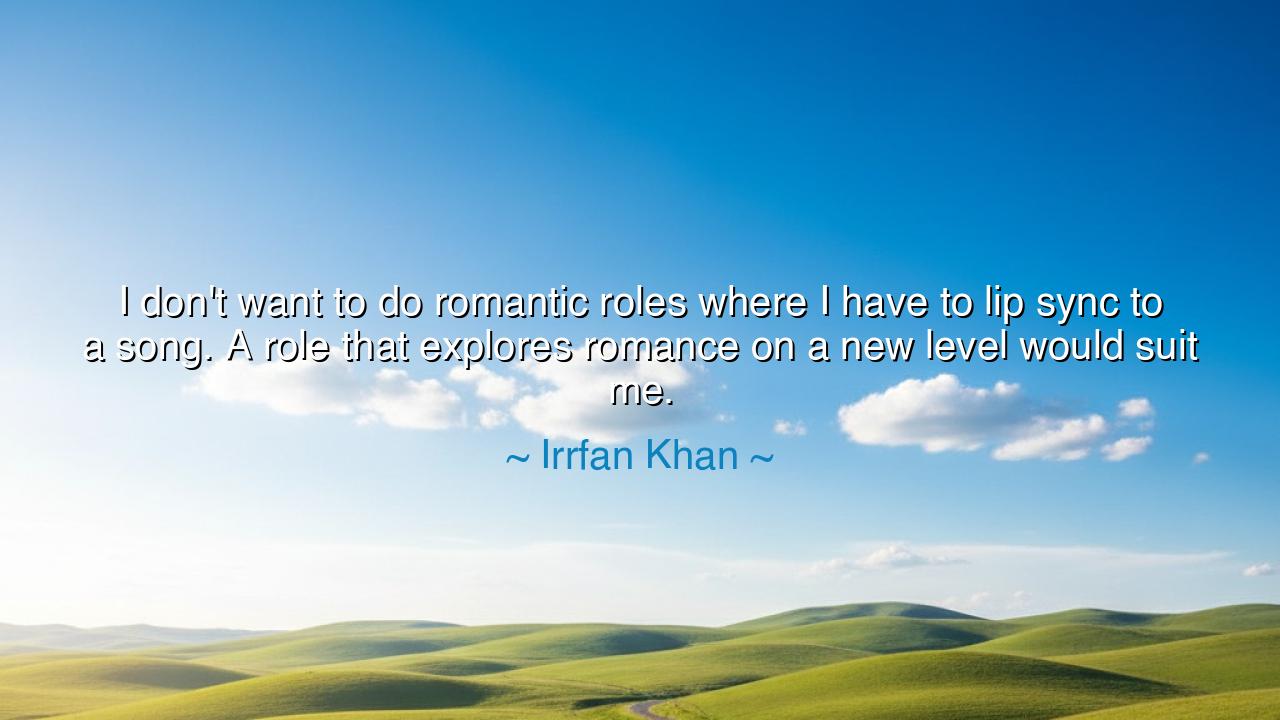
I don't want to do romantic roles where I have to lip sync to a
I don't want to do romantic roles where I have to lip sync to a song. A role that explores romance on a new level would suit me.






In the wise words of Irrfan Khan, "I don't want to do romantic roles where I have to lip sync to a song. A role that explores romance on a new level would suit me," we find a profound reflection on the nature of love and the portrayal of human connection in art. Khan's words call attention to a deeper aspect of romantic storytelling—the desire to explore love not through superficial gestures or performative tropes, but through a genuine, multi-dimensional understanding of what it means to truly connect with another person. His rejection of conventional roles that reduce romance to mere musical numbers and choreographed sequences points to the universal truth that romantic love is far more complex and layered than the songs we often use to represent it. True love, Khan implies, deserves more than just surface-level portrayals; it demands depth, vulnerability, and a real exploration of the human soul.
The ancients understood the complexities of romantic love far beyond the simplistic portrayals we sometimes encounter. In the Greek myths, love was often entangled with conflict, sacrifice, and the tragic—not merely sweet moments of serenades or moonlit dances. Consider the story of Orpheus and Eurydice. Orpheus’s love for Eurydice is profound, but it is tested by the trials of the underworld. His desire to bring her back to life speaks to the depth of his romantic commitment, yet his inability to resist looking back reveals the tragic limits of love. In this myth, the relationship is not reduced to simple gestures of affection, but is examined through the suffering and loss that often accompany deep emotional bonds. This, too, is what Irrfan Khan seeks—romantic roles that acknowledge the complexity of love, moving beyond mere lip-syncing and toward a more genuine portrayal of human connection.
In the same way, Shakespeare presented romantic love as a force that could elevate, but also destroy. In Romeo and Juliet, the love between the two protagonists is not just passionate, it is also tragic, a love that defies families, fate, and reason. Yet, their sacrifice and devotion to each other raise romance to a heroic and poignant level. Their story is not about idealized love but about the raw emotion, the commitment, and the struggle that love often entails. Similarly, Khan's desire to portray romance "on a new level" reflects a desire to move beyond the predictable and comfortable, to explore the true nature of romantic connection—one that is full of both joy and sorrow, fulfillment and sacrifice.
Khan’s desire for a role that explores romance on a deeper level also reflects a yearning for authenticity in art. To portray a genuine romance is to explore the vulnerabilities of the heart, the risks inherent in opening oneself to another person. This idea of vulnerability in love was embodied by the great figures of history, such as Antony and Cleopatra, whose love, though politically charged, was also marked by profound passion and ultimate tragedy. Theirs is a romance that speaks to the impermanence of love, yet also to its transformative power. Like Khan, they sought something more than superficial expressions of love; their love was tied to destiny, loss, and identity. To explore such love in art is to delve into what it means to be fully human, to confront not only the beauty of love, but its pain and complexity.
The romanticism that Khan refers to, the type of role that would “suit” him, speaks not to the traditional or predictable, but to a deeper and richer exploration of human relationships. In the Roman world, we see similar ideals in the writings of Ovid, whose Metamorphoses transformed romantic stories into grand myths full of complexities, challenges, and transformation. Ovid’s tales are not simplistic, but rather intricate and layered, illustrating the power and mystery of love. Just as Ovid saw love as a transformative force, so too does Khan seek roles where romance is not just an emotion but an experience, one that requires growth, sacrifice, and understanding.
The lesson Khan offers, then, is one of authenticity and depth in our own lives. To approach love—not just in art, but in reality—requires us to embrace both its beauty and its complexity. We must be willing to explore love in all its forms: not as something light and fleeting, but as something that challenges us, changes us, and teaches us. Much like the ancient heroes and the tragic lovers of myth and history, we must learn that love, though beautiful, can also bring loss, pain, and growth. It is not enough to just seek the romantic ideal; we must be willing to face the full spectrum of emotions that come with love—the vulnerability, the sacrifice, and the unexpected twists.
In your own life, strive to embrace romance in its fullest form. Understand that love is not just about the easy moments or the perfect expressions, but about the journey—the growth that happens when two people share both their joys and their vulnerabilities. Be open to love in its complexity, knowing that it may require you to step beyond the familiar, to risk your heart, and to explore new depths. Just as Irrfan Khan seeks a role that challenges the traditional portrayal of romance, let your own experiences with love be one that challenges and transforms you, leading to a deeper understanding of yourself and the world around you.






AAdministratorAdministrator
Welcome, honored guests. Please leave a comment, we will respond soon